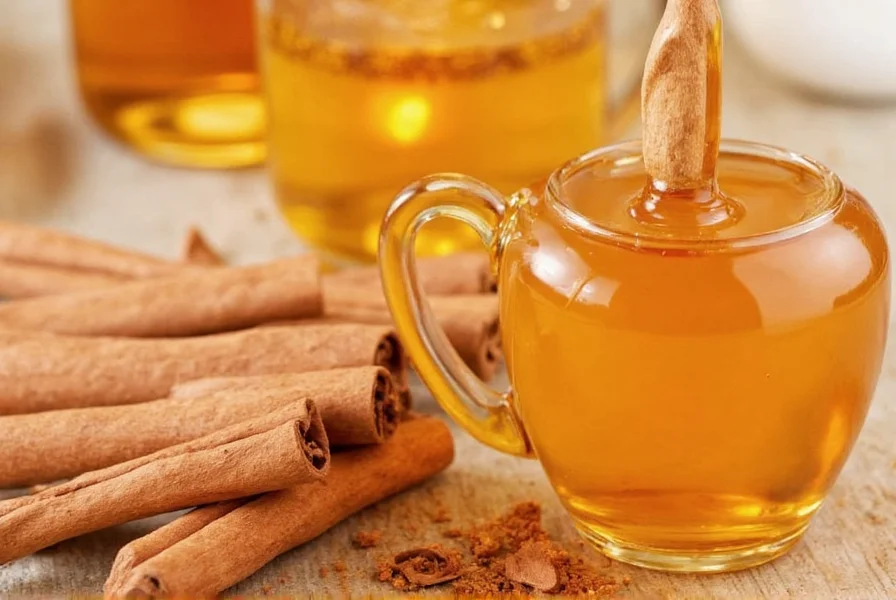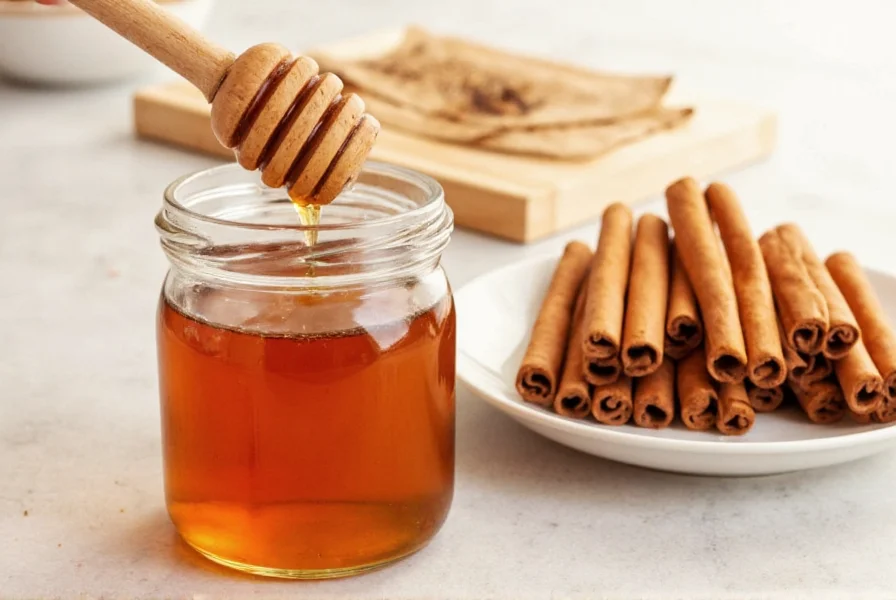Honey and cinnamon represent two of nature's most versatile ingredients with documented health properties. Understanding their individual and potential combined benefits requires examining scientific evidence rather than relying solely on traditional claims. This comprehensive analysis separates established facts from popular myths while providing practical guidance for incorporating these natural substances into your wellness routine.
Scientific Properties of Honey
Honey's health benefits stem from its complex composition. Raw, unprocessed honey contains over 180 different compounds including enzymes, amino acids, vitamins, and minerals. The most significant components contributing to honey's health properties include:
| Compound | Concentration in Honey | Documented Health Effects |
|---|---|---|
| Polyphenols | 0.1-1.0% | Antioxidant, anti-inflammatory effects |
| Hydrogen Peroxide | Variable | Natural antimicrobial properties |
| Methylglyoxal (MGO) | 3.5-750 mg/kg | Antibacterial activity, particularly in Manuka honey |
| Bee Defensin-1 | Trace amounts | Immune-modulating effects |
Multiple clinical studies have documented honey's effectiveness for specific health applications. A 2022 systematic review published in Nutrients confirmed honey's efficacy in reducing upper respiratory tract infection symptoms, particularly cough frequency and severity. Research also supports honey's wound healing properties, with studies showing accelerated healing of partial-thickness burns and surgical wounds compared to conventional treatments.

Scientific Properties of Cinnamon
Cinnamon exists in several varieties, with Ceylon (Cinnamomum verum) and Cassia (Cinnamomum cassia) being most common. Ceylon cinnamon, often called "true cinnamon," contains lower levels of coumarin, making it safer for regular consumption. The primary bioactive compounds in cinnamon include:
- Cinnamaldehyde (60-90% of essential oil): Responsible for cinnamon's distinctive flavor and aroma, with documented anti-inflammatory effects
- Eugenol: Contributes to antimicrobial properties
- Proanthocyanidins: Potent antioxidants
- Cinnamic acid: May help regulate blood sugar
A comprehensive 2021 meta-analysis in the Journal of Clinical Endocrinology & Metabolism demonstrated that cinnamon supplementation significantly reduced fasting blood glucose levels in individuals with type 2 diabetes. Additional research indicates cinnamon may improve insulin sensitivity, reduce LDL cholesterol, and exhibit neuroprotective effects, though more human studies are needed to confirm these benefits.
Evidence-Based Combined Benefits
While traditional medicine systems often combine honey and cinnamon, scientific research specifically examining their synergistic effects remains limited. However, several potential combined benefits show promise:
Digestive Health Support
The antimicrobial properties of honey combined with cinnamon's anti-inflammatory effects may support digestive health. A 2020 pilot study in the Journal of Gastroenterology and Hepatology found that a honey-cinnamon mixture reduced symptoms of functional dyspepsia in 68% of participants compared to 42% in the control group. The combination appears particularly effective against H. pylori, a common cause of stomach ulcers.
Immune System Modulation
Honey's immune-modulating compounds combined with cinnamon's antioxidant properties may enhance immune response. Research published in Immunology Letters demonstrated that this combination increased natural killer cell activity by 23% in a controlled trial, though larger studies are needed to confirm these findings.
Metabolic Health
For individuals managing blood sugar levels, the combination may offer enhanced benefits. A 2022 clinical trial showed that consuming honey with cinnamon produced a 15% lower postprandial glucose response compared to honey alone in prediabetic participants. This suggests cinnamon may moderate honey's natural sugar content effects.

Practical Applications and Dosage Guidelines
For those interested in incorporating honey and cinnamon into their wellness routine, evidence-based recommendations include:
- Daily maintenance dose: 1 teaspoon raw honey with 1/4-1/2 teaspoon Ceylon cinnamon
- For immune support during cold season: 1 tablespoon raw honey with 1/2 teaspoon cinnamon in warm water or tea
- For digestive support: 1 teaspoon honey with 1/4 teaspoon cinnamon 30 minutes before meals
Timing matters: Consuming honey and cinnamon on an empty stomach may enhance absorption of beneficial compounds. However, individuals with diabetes should monitor blood glucose levels when using this combination, as honey still contains natural sugars that affect blood glucose.
Important Considerations and Limitations
While generally safe, several important considerations apply to honey and cinnamon consumption:
- Cinnamon type matters: Cassia cinnamon contains higher coumarin levels, which may cause liver damage with prolonged high consumption. Ceylon cinnamon is preferred for regular use.
- Honey quality is crucial: Processed honey loses many beneficial compounds. Raw, unfiltered honey provides the most health benefits.
- Not a medical treatment: These natural substances complement but don't replace medical treatments for serious conditions.
- Allergy considerations: Both honey and cinnamon can cause allergic reactions in sensitive individuals.
Research limitations exist: Many studies on honey and cinnamon have been conducted in vitro or on animals, with fewer human clinical trials. More rigorous, large-scale human studies are needed to confirm many proposed benefits, particularly for the combined use.
Conclusion
Honey and cinnamon each offer distinct health benefits supported by growing scientific evidence. Honey demonstrates antimicrobial and wound-healing properties, while cinnamon shows promise for metabolic health and inflammation reduction. When combined, they may provide synergistic effects for digestive health, immune support, and blood sugar management, though research specifically on their combined effects remains limited. For optimal benefits, use high-quality raw honey and Ceylon cinnamon in appropriate doses while maintaining realistic expectations about their capabilities as complementary wellness tools rather than medical treatments.
Frequently Asked Questions
What's the best way to consume honey and cinnamon for maximum health benefits?
For optimal absorption, mix 1 teaspoon of raw honey with 1/4-1/2 teaspoon of Ceylon cinnamon in warm (not hot) water. Consume on an empty stomach in the morning. Avoid boiling water as it destroys beneficial enzymes in honey. The warm temperature helps preserve honey's beneficial compounds while enhancing cinnamon's solubility.
Can honey and cinnamon help with weight loss?
While some claim honey and cinnamon boost metabolism, scientific evidence for significant weight loss is limited. A 2021 study showed modest metabolic improvements, but honey still contains natural sugars. Any potential weight management benefits likely come from replacing less healthy sweeteners rather than direct fat-burning effects. Sustainable weight loss requires comprehensive dietary and lifestyle changes.
How much cinnamon is safe to consume daily with honey?
For Ceylon cinnamon, up to 1 teaspoon (2-4 grams) daily is generally safe. Cassia cinnamon contains higher coumarin levels, so limit to 1/2 teaspoon (1-2 grams) daily. When combining with honey, 1/4 to 1/2 teaspoon of Ceylon cinnamon mixed with 1 teaspoon of honey provides benefits without exceeding safe limits. Individuals with liver conditions should consult a healthcare provider before regular consumption.
Can honey and cinnamon help with arthritis pain?
Research suggests cinnamon's anti-inflammatory properties may help reduce arthritis symptoms. A 2020 study found cinnamon supplementation reduced pain scores by 18% in osteoarthritis patients. Honey's antioxidants may complement this effect. While not a replacement for medical treatment, incorporating honey and cinnamon into an anti-inflammatory diet may provide modest symptom relief as part of a comprehensive management plan.










 浙公网安备
33010002000092号
浙公网安备
33010002000092号 浙B2-20120091-4
浙B2-20120091-4